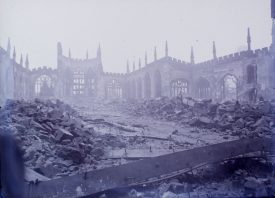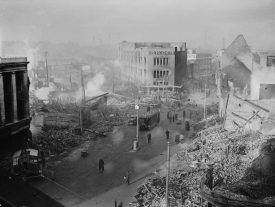During World War Two George, my husband, was in a reserved occupation tool-making for war factories. I was a housewife and we lived in Three Spires Avenue. Our son Glynn was only one when raids began.
We didn’t have an Anderson shelter as they often flooded after rain. So George made a protected area in the front room by pulling the piano into the middle of the room. We put a mattress and lined it with cushions, pillows and blankets and here we kept emergency bags containing toiletries, a bit of food and spare clothing. Basic necessities only. Our evening meal was often late because of George’s overtime and having to cycle home in the blackout.
The Coventry Blitz
On the 14th November, we had just finished washing up some pans and placed them on the tabletop mangle. Glynn had been put to bed upstairs when we heard the distinctive noise of German airplanes and the siren going off full blast. The swish of firebombs and bomb explosions followed. I dashed upstairs for Glynn and brought him down and snuggled with him in our den. George went outside to watch for firebombs as our neighbours were a widow and a daughter who left each night for the countryside, as many families did. So fire-watching was vital for the few men left.
Some time after 10 pm there was a terrific explosion on our side of the crossroads caused by a landmine and three men were killed. The blast practically demolished the four corner houses. Fires were started, roofs suffered and windows and front doors were blown off. Fires lit up the area and made easy targets for bombs.
Walk to safety
Fortunately we ourselves received no physical damage and George thought for safety he should take to us to the deep shelter on Radford Common. A good ten to fifteen minutes walk away as we would be loaded with a baby and bags. The night was bright as day with the sky lit up by fires and a full moon in a cloudless sky. The firebombs and gunfire flack that were still falling meant that we had to take cover in the nearest Anderson street shelter. Luckily someone had left a dining chair in this shelter, which I sat on gratefully with Glynn on my knees.
George returned to his fire-watching popping in occasionally to see if we were OK. Not a soul appeared or went by. No air raid warden came, no volunteer checking the blackout or families running for their lives. It began to feel uncanny as absolutely no one but George came along. What a relief when the all clear sounded and we were able to make our way back home. Yet again no one appeared in that street. It was only later in the day that we learned why. A delayed action bomb had dropped in the garden of the house directly opposite to where we had taken refuge. The whole street had been evacuated before we arrived there. And we had been sitting there the whole of the night! Truly we were saved to serve.
Happily married
When the war started we had been married just four years but the Lord gave us the privilege to have 65 years happily together serving him in many various ways. And so it is to him I give all the glory.
Originally published on the BBC’s WW2 People’s War website as the article My Family and The Blitz. This article has been reproduced with permission of the BBC, and Warwickshire Libraries.









Comments
I was born in the Bassett Road nursing home, on Three Spires Avenue and moved back there in 1956 to live with my grandad. I was great friends with the Powell family as they were all involved with Radford Methodist Church which I went to in the Boys Brigade. I think I remember that Trevor Powell moved to Australia. We both used to catch the 5 bus to school, Trevor to Caludon Castle and Bablake for me.
Add a comment about this page